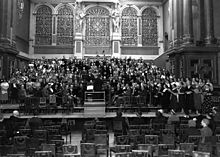User:Sydneyf582/sandbox
A Normal Tuesday[edit]
Sunny Morning[edit]
The sun was shining this morning[1]. I have class at 1pm today.
Drafting Edits[edit]
History[edit]
1933–1937[edit]

Founded by Kurt Singer, the organization was originally named Kulturbund Deutscher Juden (Cultural Federation of German Jews) in 1933, but in April 1935 the Nazi authorities – forcing the organization to delete the term German from the name – imposed a change of the name into Jüdischer Kulturbund (Jewish Cultural Federation).[2] Also known as the Kubu, the Kulturbund was an institution created by unemployed Jewish performers with the consent of the Nazis for the Jewish population. The Kulturbund was one of the most famous examples of Jewish creativity in response to cultural exclusion. It provided a semblance of leisure for its 70,000 members in forty-nine different locals.[3]
After the exclusion of Jewish Germans and gentile Germans of Jewish descent from participating in almost all organizations and public events, the Kulturbund Deutscher Juden tried to provide some compensation, as tried Israelitisches Familienblatt.
In June of 1933, Kurt Singer sent a detailed proposal for the Kulturbund to police and various high ranking officials within the Ministry of Propaganda. The original proposal stated that the organization would employ only Jewish artists and staff, consist of one theatre troupe and one opera ensemble of approximately 15 members each, a choir of 12 singers, and a chamber orchestra of 25 musicians. The proposal also detailed Singer's repertoire plan, costs, organizational structure, advertising plan, and technical and personnel issues. Hans Hinkel, the newly appointed Prussian minister of culture at the time, initially rejected the idea for the organization. Singer engaged in persistent negotiations with Hinkel, culminating in a face-to-face meeting in which Hinkel agreed to approve the organization under the conditions that the Kulturbund programming engaged only Jews and occurred in closed quarters.[4]
The Kulturbund became the center of a debate within the Jewish community of Berlin when Singer began to advertise the organization to the public. Zionist journalists wrote about the importance of the theatre to include Jewish nationalist themes in its repertoire and serve as a political outlet for the Jewish population. However, Singer strongly believed that the Kulturbund should remain above politics and focus on art creation and performance. The artists of the Kulturbund grew up as Germans and viewed the organization as a place of work and economic advantage rather than a place to further their Jewishness. In its early development, the Kulturbund battled with choosing repertoire, facing censorship from the Nazi government as well as differing ideological opinions within the local Jewish community.[4]
From 1933 to 1937, the Kulturbund put on theatrical performances, concerts, exhibitions, operas and lectures all over Germany, performed by Jewish entertainers, artists, writers, and scientists who were no longer permitted by the Nazi Party regime to appear before non-Jewish audiences. Thus, Jewish performers could again earn their livelihood, however scarce. The performances took place at authorized segregated venues with "Jewish only" attendance, meaning Jewish Germans and gentile Germans of Jewish descent.
 | This is a user sandbox of Sydneyf582. You can use it for testing or practicing edits. This is not the sandbox where you should draft your assigned article for a dashboard.wikiedu.org course. To find the right sandbox for your assignment, visit your Dashboard course page and follow the Sandbox Draft link for your assigned article in the My Articles section. |
blablabla
- ^ SHIRA., KLEIN, (2020). ITALY'S JEWS FROM EMANCIPATION TO FASCISM. CAMBRIDGE UNIV PRESS. ISBN 1-108-43935-7. OCLC 1137194516.
{{cite book}}: CS1 maint: extra punctuation (link) CS1 maint: multiple names: authors list (link) - ^ Cf. Ingrid Schmidt, "Kulturbund Deutscher Juden – Jüdischer Kulturbund Berlin: Ein Namensstreit?", In: Geschlossene Vorstellung: Der Jüdische Kulturbund in Deutschland 1933–1941, Akademie der Künste (ed.), Berlin: Edition Hentrich, 1992, pp. 223–230, here p. 229.
- ^ Marion A. Kaplan, Between Dignity and Despair: Jewish Life in Nazi Germany, Oxford University Press, 1998, p.46
- ^ a b Rebecca, Rovit, (2012). The Jewish Kulturbund Theater Company in Nazi Berlin. University of Iowa Press. ISBN 978-1-60938-124-0. OCLC 812831607.
{{cite book}}: CS1 maint: extra punctuation (link) CS1 maint: multiple names: authors list (link)
